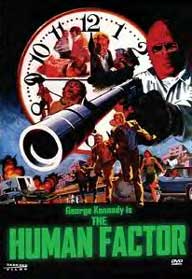 THE
HUMAN FACTOR (1975)
THE
HUMAN FACTOR (1975)Director: Edward Dmytryk
Dark Sky Films/MPI
 THE
HUMAN FACTOR (1975)
THE
HUMAN FACTOR (1975)By 1975, audiences
had been introduced to a new era of action packed revenge stories, especially
with the success of DEATH WISH starring Charles Bronson. One of the almost forgotten
entries in the cinema of violent vendettas is THE HUMAN FACTOR, a European shot
vehicle for character actor extraordinaire George Kennedy and directed by the
legendary Edward Dmytryk (THE CAINE MUTINY, THE CARPETBAGGERS), who by this
time was getting on in years and on a steady decline career-wise. Originally
released by the infamous Byranston Pictures (a supposed mafia run distribution
outfit), Dark Sky has saved yet another 1970s cultish effort from obscurity.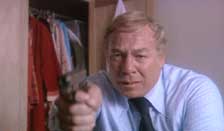
John Kinsdale (Kennedy) is a NATO computer programmer working and living in Napes, Italy with his family. One night, he arrives home to find his house has become a media circus, as his wife and three young children had been found gunned down under mysterious circumstances. Using his at-work computer system, Kinsdale is able to gather information that will lead him to the killers, with the help of co-worker and friend Mike McAllister (John Mills). Not wanting to cooperate with the police’s investigation, Kinsdale soon discovers on his own that the culprits are a group of terrorists bent on murdering American families living in Europe. Tracking down the killers while evading the police leads Kinsdale into a web of violence, but his obsession and determination to avenge his family ultimately takes precedent.
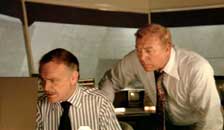 THE
HUMAN FACTOR is a flawed attempt at blending the popular 1970s action movie
themes of conspiracies, terrorism and revenge, but it does have a few things
to recommend it. George Kennedy is actually given one of his best starring roles
of the decade and gives a very human performance as an everyday family man who
now has nothing to live for (he contemplates suicide, aiming his gun at a the
TV instead) but to find his family’s killers and he stops at nothing to
do so. When the burly, imposing John Kinsdale is mad, you can totally accept
him chain-choking a thug in an alley, or facing a string of machine gun toting
masked assailants in a supermarket. Kennedy brings some tender moments to the
piece (like when he’s clutching his murdered daughter’s doll) but
he’s tough as nails throughout and gives a convincing performance, and
he’s has some nice on-screen chemistry with Mills.
THE
HUMAN FACTOR is a flawed attempt at blending the popular 1970s action movie
themes of conspiracies, terrorism and revenge, but it does have a few things
to recommend it. George Kennedy is actually given one of his best starring roles
of the decade and gives a very human performance as an everyday family man who
now has nothing to live for (he contemplates suicide, aiming his gun at a the
TV instead) but to find his family’s killers and he stops at nothing to
do so. When the burly, imposing John Kinsdale is mad, you can totally accept
him chain-choking a thug in an alley, or facing a string of machine gun toting
masked assailants in a supermarket. Kennedy brings some tender moments to the
piece (like when he’s clutching his murdered daughter’s doll) but
he’s tough as nails throughout and gives a convincing performance, and
he’s has some nice on-screen chemistry with Mills.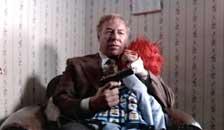
One of the main
problems here (by no fault of its own) is that the story relies on computer
technology to aid the main character, but the computers shown are so dated and
primitive now that it’s sometimes hard to take seriously. Some of the
car chases and running chases are clumsy and uneventful, and although the climax
is pretty wild (watch a housewife pick up a machine gun in self defense!) it
happens all too quickly. There a bits of blood and brutality, but it's surprising
(seeing that this was released in the lenient mid 1970s) that this couldn’t
get away with a PG rating. The international cast makes things more lively,
including Raf Vallone as a Naples police chief, Arthur Franz as a cranky general,
Barry Sullivan (who had aged considerably in the ten years since PLANET OF THE
VAMPIRES) as a toasted American Embassy official, Shane Rimmer as a CIA man,
and Haydée Politoff (COUNT DRACULA’S GREAT LOVE) as “Pidgeon.”
The very talented Rita Tushingham is wasted as another one of Kinsdale’s
concerned co-workers, but has very little to do. The soundtrack was composed
by the ever-busy Ennio Morricone, and even though it has some haunting moments,
it’s certainly not his most 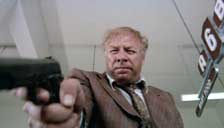 memorable
work.
memorable
work.
Dark Sky Films
presents THE HUMAN FACTOR uncut in its original 1.85:1 aspect ratio with anamorphic
enhancement. The picture looks good for the most part, with colors being accurate
if not overly vivid. At times the film elements show their age with grain and
other blemishes. The English mono audio track is solid enough, and there are
optional English subtitles. 
The main extra is a 25-minute featurette entitled “The Kennedy Factor: An Interview with George Kennedy.” Kennedy (who at 81 is spry as ever) sits down for a delightful candid interview, first talking about his childhood, his early days in Hollywood and winning the Academy Award in 1968. He then moves on to THE HUMAN FACTOR, sharing his memories of making the film in Naples, his relationship with director Dmytryk and co-star Mills, as well as some other fun behind-the-scenes stuff which I won’t spoil here. The other supplements on the disc are an original TV spot and a still gallery. (George R. Reis)